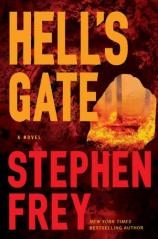Hell’s Gate
Review
Hell’s Gate
Stephen Frey was known primarily as an author of financial
thrillers, perhaps most notably for his series featuring Christian
Gillette. The majority of his work, however, has consisted of
stand-alone novels. Recently he has been edging away from the world
of commodities trading, corporate takeovers and high finance. While
his latest offering, HELL’S GATE, is involved to some extent
with business matters, Frey goes far afield, both geographically
and topically, from Wall Street. The result may well be his most
complex and intriguing work to date.
HELL’S GATE takes place in the isolated setting of Fort
Mason, Montana, and commences with a number of independent
storylines that, while occurring in the same geographical area,
begin to converge almost from the beginning of the narrative but do
not thoroughly intersect until well after the book’s midway
point. Each are equally interesting in their own right. Hunter Lee
is a relatively young, wildly successful trial attorney with a
white shoe New York law firm where, it turns out, there is an
unequal division of work and reward. He has a reputation that
precedes him into Fort Mason, where he has brought a legal action
against Bridger Railroad, the negligence of which has resulted in
horrific injuries to Hunter’s clients. His success in the
case is greater than he anticipates, but his triumph is tempered
when he has divorce papers served upon him just as the trial is
concluded.
Hunter’s brother, Strat, is a long-time resident of
Montana who, in the aftermath of the trial, attempts to persuade
Hunter to move to the area. Strat is employed by Butch Roman, the
owner of an extremely successful construction company that is in
the middle of a project for Callahan Foods Company, one of the
area’s major employers and whose owner, Dale Callahan, is
being pressured to sell a part interest in his company to Katrina
Mason, the latest generation of the family that established the
isolated town of Fort Mason. Mason is functioning as a straw figure
for George Drake, the unprincipled CEO of Bridger Railroad.
Callahan, on the other hand, is friendly with U.S. Senator
William “Big Bill” Brule, who owns a logging company in
the area. Brule has left the day-to-day operations in the hands
of his older son, Jeremy, who is close to overseeing the
ruination of the business. It is Brule’s younger son, Paul,
who is better suited to run the company, but he wants no part of
it. Paul is a respected, almost legendary Fire Jumper who finds
himself in the area after a series of mysterious fires destroy
thousands of acres of timber. Just about everyone, from Big Bill to
Hunter to Drake, has one or more secrets here; and the mystery that
hangs over the entire proceeding is not so much who is profiting
from the fires but who is profiting the most.
The characters in HELL’S GATE are broadly though not
especially deeply drawn. However, the pristine setting and the
interwoven plots call to mind such epic television series as
“The Big Valley” and “Dallas,” so that one
is irrevocably drawn into the narrative almost immediately. And
Frey perfectly captures a tipping point, one of those moments that
individuals will almost universally recognize yet rarely discuss:
Hunter, though New York through and through, sits in a no-sign Fort
Mason restaurant named The Lion’s Den, having a cheeseburger
and a beer, and suddenly understands, in a moment of clarity, why
people want to spend the rest of their lives in Montana.
It is one of those very true-to-life moments that one encounters
in the best fiction; for those who are fortunate enough to have
experienced such a moment of illumination at some point in their
lives, it is immediately recognizable and gratifying. HELL’S
GATE is worth reading for that reason alone, and for so much
more.
Reviewed by Joe Hartlaub on January 22, 2011





